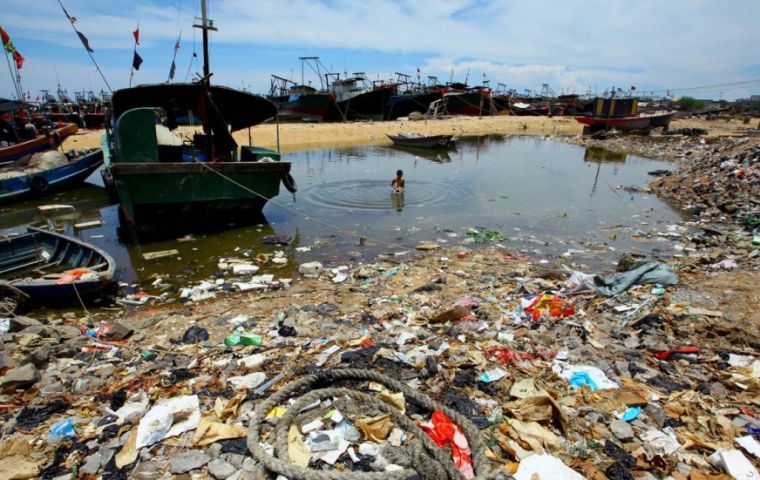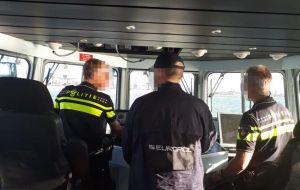MercoPress. South Atlantic News Agency
First global multi-agency operation against marine pollution crimes
 The global network of “30 Days at Sea” coordinators involved environmental, maritime and border agencies, police forces, customs, and port authorities
The global network of “30 Days at Sea” coordinators involved environmental, maritime and border agencies, police forces, customs, and port authorities  Serious contamination was found in Germany: a vessel discharged 600 liters of palm oil into the sea. In Ghana gallons of waste oil in large bottles dumped at sea
Serious contamination was found in Germany: a vessel discharged 600 liters of palm oil into the sea. In Ghana gallons of waste oil in large bottles dumped at sea An international law enforcement operation against maritime pollution has revealed hundreds of violations and exposed serious cases of contamination worldwide. Codenamed 30 Days at Sea, the month-long (1 to 31 October) operation saw some 276 law enforcement and environmental agencies across 58 countries detect over 500 offences, including illegal discharges of oil and garbage from vessels, ship-breaking, breaches of ship emissions regulations, and pollution on rivers and land-based runoff to the sea.
Steered by a global network of 122 national coordinators, 30 Days at Sea involved environmental, maritime and border agencies, national police forces, customs, and port authorities.
More than 5 200 inspections have resulted in at least 185 investigations with arrests and prosecutions anticipated.
Serious contamination was found in Germany, where a vessel discharged 600 liters of palm oil into the sea. Ghana uncovered gallons of waste oil in large bottles thought to be illegally dumped at sea.
Authorities prevented an environmental disaster in Albania by securing waters around a sinking vessel containing some 500 liters of oil. Similarly, the pollution threat resulting from the collision of two ships in French waters was contained thanks to preventive action during the operation.
Innovative technologies were used to detect offences including satellite images (Argentina, Sweden), aerial surveillance (Canada, Italy), drones (Indonesia, Nigeria and Pakistan) and night vision cameras.
“This is why law enforcement must team up on a global scale to build strong international links with specialized experts so we can tackle this devastating crime while ensuring a healthier, safer planet for all,” responded Wil van Gemert, Deputy Executive Director of Europol, Operations Directorate.
“Criminals believe marine pollution is a low-risk crime with no real victims. This is a mistake and one which Interpol and our partners are addressing as demonstrated by this operation,” said Interpol Secretary General Jürgen Stock. “Marine pollution creates health hazards worldwide which undermine sustainable development and requires a multi-agency, multi-sector cooperative response within a solid global security architecture,” added the Interpol Chief.
UN Environment Executive Director Erik Solheim said that the issue of illegal marine pollution is one that global communities may well be able to tackle successfully in the next decade. “But we need the help of our law enforcement partners to make sure that there is no impunity for the perpetrators of marine pollution crime.” added the UN Environment Executive.
Coordinated by Interpol's Environmental Security Program in close partnership with Europol, 30 Days at Sea was driven by a range of cooperative enforcement actions, involving pre-operational intelligence meetings, with domestic and regional training to strengthen tactical planning and international cooperation. Europol coordinated the actions in the Euro-Mediterranean region including two operational meetings and operational analysis support. In total, 3 323 actions were carried out including 120 prosecuted and 210 pollution incidents detected.




Top Comments
Disclaimer & comment rulesCommenting for this story is now closed.
If you have a Facebook account, become a fan and comment on our Facebook Page!